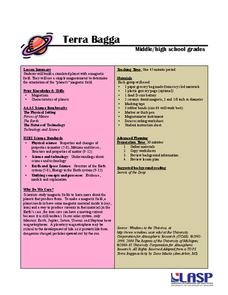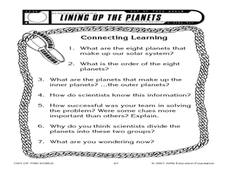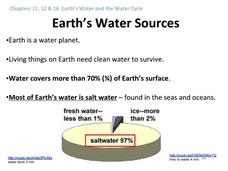Curated OER
What's "In" There: A Study of the Inner Planets - Mercury, Venus, Earth, and Mars
First graders identify and explore the four inner planets. In this planet science lesson, 1st graders watch a PowerPoint about the planets. Students read the book Our Solar System and discuss the inner planets. Students create a book...
Curated OER
Number Forms and Order
In this number forms and order worksheet, 5th graders answer 10 multiple choice questions, not interactively, with answers available online.
Curated OER
Our Solar System
In this space science worksheet, students use the clues at the bottom of the sheet to solve the crossword puzzle on our solar system. They identify the different planets and their location in relation to the sun.
Curated OER
Scale Model of the Solar System
Lead your class through the procedure to create a scale model of the solar system. This resource reinforces concepts of scale and the mathematics involved, as well as the planets. Attach paperclips and staples to index cards to show the...
Curated OER
Planets Word Search Wordsheet
In this word search worksheet, student locate the names of 9 planets which are located in a word bank at the bottom of the page. They read a mnemonic device for remembering the names of the planets.
University of Colorado
Terra Bagga
One way to identify possible volcanic activity on other planets is by testing the planet for magnetism. A science instructional activity begins with pupils constructing their own planet from a dead battery, magnets, paper, and...
University of Colorado
Terra Bagga
Earth's magnetic poles switch positions about every 200,000—300,000 years. In the activity, groups create a planet with a magnetic field. Once made, they use a magnetometer to determine the orientation of the planet's magnetic field....
Curated OER
Lining up the planets
Students follow cue cards in order to order the planets in the correct order in the solar system. In this planets lesson plan, students work in groups to make a 2D model of the planets.
Curated OER
Planets
In this online interactive planets worksheet, students respond to 9 multiple choice and fill in the blank questions regarding the information included in the provided paragraphs.
Curated OER
The Outer Planets
In this outer planets activity, students determine if 15 statements about Neptune, Pluto, Saturn and Uranus are true or false. If they are false, students change the italicized words in the sentences to make the statements true.
Curated OER
The Earth and Beyond
Photographs and graphics bring the solar system and Earth to life in this presentation. Viewers are taken on a virtual field trip, beginning with the sun and planet placement, and proceeding through both Earth and the moon's movements....
Curated OER
Space Weight, Gravity, and Distance
In this planets in space worksheet, high schoolers calculate their weight on the 9 planets plus calculate the distance of the planets from the sun in astronomical units. This worksheet has 6 fill in the blank and 3 short answer questions.
Curated OER
Planets an Introduction
Fourth graders investigate one planet, enter information into a database, and print the database sorting for each of the attributes.
Curated OER
Planet Dance
High schoolers examine Anna Halprin's philosophies and choreography and perform one of her Planet Dances. They find a site that inspires them to create a dance based on the environment's design, levels, textures, and atmosphere.
Curated OER
The Planets in our Solar System
In this solar system worksheet, students will write in the nine planets that are found orbiting around our sun in our solar system.
Chicago Botanic Garden
Personal Choices and the Planet
The last activity in the series of four has individuals determine steps they can take to reduce their carbon footprints and then analyze their schools' recycling programs. Through a sustainability audit, they identify how and where their...
Curated OER
Active and Passive Sentences
Work with active and passive voice in several different sentences. Fifth graders learn the difference between active and passive voice, and change nine sentences from passive to active and vice versa. Great practice in your writing unit!
Curated OER
Bringing the Solar System to Life
Young scholars walk marked paths as they simulate the orbit of the planets. In this solar system lesson, students recognize the relationship between the sun and the planets. Young scholars visualize how the phases of the moon are seen.
Curated OER
Online Planetary Tour
Students develop an interactive presentation about the planets for their fictional interplanetary travel agency. They demonstrate their knowledge of internet research techniques and the Solar System through their interactive planetary...
ARKive
Species Discovery
How many of your students know that even today new species are being found all over the globe? Introduce them to the amazing diversity our planet houses with a creative activity about animal variation and classification. They'll use a...
Curated OER
Where in Our Solar System Are We?
Second graders research distance between planets and the sun using encyclopedias. They use toilet paper sheets as a unit of measurement (50 million km.) students stand at planet locations using toilet paper to measure distance between.
Curated OER
Earth Science
Students explore the planets and celestial bodies in our solar system. In this outer space lesson, students identify the planets and record journal information about them and other celestial bodies. Students define outer space words.
Curated OER
Earth's Water Sources
General facts about Earth's water sources, human use, and the water cycle are outlined by this presentation. Slide three has a grammatical error and slide nine refers to the local watershed of the author, so you will need to make a few...
Teach Engineering
Biomes and Population Dynamics - Balance Within Natural Systems
How large can a population become? The fifth installment of a nine-part unit teaches young ecologists about limiting factors that determine the carrying capacity of species in the Sonoran Desert. Here is a PowerPoint to help present this...

























